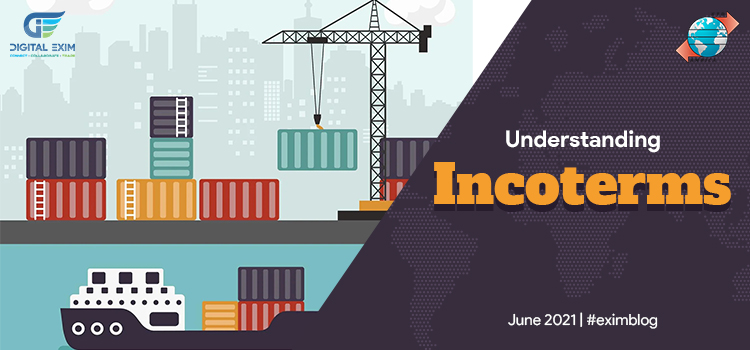Many Export Import Courses in India, in their technical teachings of Export Import Trade, focuses on Incoterms yet fail to make it simple. International trade is incomplete without Incoterms. Incoterms are the basic principle on which the Export Import Trade of the whole world runs smoothly.
Since Incoterms are so important that they can not be avoided, we decided to shed some light on the topic and make it simpler to understand.
Let us begin with a definition of Incoterms:
The International Chamber of Commerce, widely known as ICC, published a set of International Commercial Terms, more frequently known as Incoterms, to facilitate commerce around the world.
Incoterms are norms for determining the responsibilities of buyers and sellers for the delivery of goods under sales contracts for international trade. These are independent of the price determined for any product by Exporter, as they are only a part of the whole export contract.
Incoterms are also independent of the method of payment that will be used in the transaction. Changes in the Incoterms were made in 2020, and according to these changes, transfer of ownership of the goods, breach of contract or product liability; all of these issues need to be considered in the contract of sale. Also, Incoterms 2020 rules can’t override any local country laws.
- The inception of Incoterms:
The concept of Incoterms came into existence because the difference in trading practices and legal interpretations between traders of different countries necessitated a common set of rules.
Incoterms were first conceived by the ICC in 1921, and the first Incoterms rules were created in 1936. They were officially designated as Incoterms in 1936. Since then, Incoterms have evolved into a codified worldwide contractual standard. They are periodically updated when international trade events require attention. Amendments and additions were made in 1953, 1967, 1976, 1980, 2000, 2010 and 2020.
It was no small task to make such terms and put them into practice. The international trade terms were decided by 13 ICC commissions made up of private-sector experts from across the world. These individuals specialize in everything from fields of immediate concern to international business.
These Incoterms are not only widely accepted but also put into practice by traders around the world.
If and when needed, the incoterms rules are changed and redefined. How are the incoterms changed and why does it happen is mentioned below.
The Incoterms 2020 drafting group, led by co-chairs Christoph Martin Radtke and David Lowe, was in charge of revising the Incoterms rules. This group is formed by experts from various nationalities chosen for their extraordinary contribution to international commercial law and to the International Chamber of Commerce over the years.
After the drafting group made its revisions, the revised drafts were circulated broadly and internationally through ICC National Committees, with the resulting comments and suggestions channelled back to the drafting group.
The final draft, once approved by the ICC Commission on Commercial Law and Practice, was submitted for adoption by the ICC Executive Board.
This broad, international consultation aimed to ensure that official ICC products possess an authority, representing the true consensus of the world business community.
What does it mean when the following terms are used!
- EXW:
The seller fulfils its obligations by having the goods available for the buyer to pick up at its premises or another named place (i.e. factory, warehouse, etc.) on a date agreed upon by both parties or within an agreed-upon timeframe.
With Ex Works, the buyer bears all risk and costs starting when the goods are made available to the buyer at the seller’s location or other named place until the products are delivered to its location. The seller has no obligation to load the goods or clear them for export.
- FCA:
The seller is responsible for either making the goods available at its own premises or at a pre-decided place. In either case, the exporter is responsible for loading the goods on the buyer’s transport and is responsible for delivery to the port and export clearance including security requirements. Risk is transferred once the goods are loaded on the buyer’s transport.
Problems occurred when previously sellers had to load goods on transport, especially when the exporter and had agreed on using a letter of credit as the payment method for this transaction, banks often require the seller to present a bill of lading with an on-board notation before they can get paid.
- CPT:
Seller clears the goods for export and delivers them to the carrier or another person stipulated by the seller at a named place of shipment. Seller is responsible for the international transportation costs associated with delivering goods to the named foreign place of destination.
The transfer of risk, on the other hand, transfers from the seller to the buyer as soon as the goods are delivered to the international carrier.
- CIP:
Seller clears the goods for export and delivers them to the carrier or another person stipulated by the seller at a named place of shipment, at which point risk transfers to the buyer. Seller is responsible for the transportation costs associated with delivering goods and procuring insurance coverage to the named place.
- DAP:
DAP means the buyer is responsible for all costs and risks associated with unloading the goods and clearing customs to import the goods into the named country of destination. Seller clears the goods for export and bears all risks and costs associated with delivering the goods to the named foreign destination not unloaded.
- DUP:
DPU is very similar to DAP except that the seller must pay for unlading the goods. Like DAP, the seller clears the goods for export and bears all risks and costs associated with delivering the goods to the named place, which can be a port or other named location in the foreign destination. The buyer is responsible for all costs and risks from this point forward including clearing the goods for import at the named country of destination.
- DDP:
According to the changes made in 2020 DDP Incoterms means the seller bears all risks and costs associated with delivering the goods to the named place of destination ready for unloading and cleared for import.
- FAS:
Free Alongside Ship, in this sellers, clear the goods for export and delivers them when they are placed alongside the vessel at the named port of shipment. Buyer assumes all risks/costs for goods from this point forward. This is not a commonly used term except for goods that may be difficult to load.
- FOB:
Seller clears the goods for export and delivers them when they are onboard the vessel at the named port of shipment. Buyer assumes all risks and costs for goods from this moment forward.
- CFR:
Seller clears the goods for export and delivers them when they are onboard the vessel at the port of shipment. The seller bears the cost of freight to the named port of destination. Buyer assumes all risks for the goods from the time the goods have been delivered on board the vessel at the port of shipment.
- CIF:







